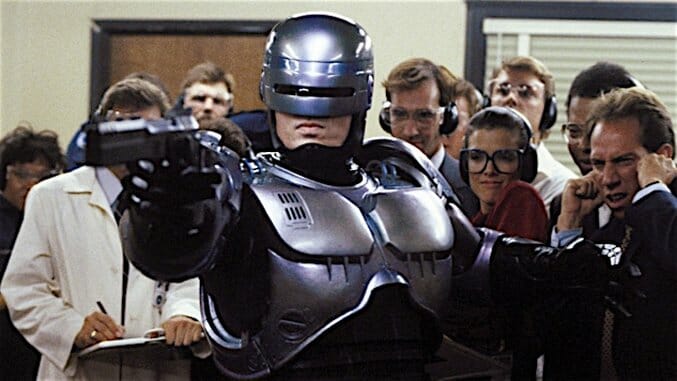RoboCop Is 30 … and No Longer Fiction

“That’s life in the big city.” —Bob Morton
There are real arguments to be made that RoboCop is one of the best works both of excessive ’80s action film and of nuanced sociopolitical satire. You’ve heard them from that same friend of yours who insists, with a maniacal grin on his face, that Die Hard is his favorite Christmas movie. (I decline to comment on whether I am this friend of yours.) Unlike, say <>the ambivalence around Starship Troopers, RoboCop has always been regarded as at least a good movie despite the fact director Paul Verhoeven’s satire sails over the heads of both the film festival set and the way-too-stoked-to-be-watching-it.
There is a lot going on in this story of a decent man made into the tireless tool of craven corporate interest. Every scene is layered with some commentary or symbolism, including some of the blistering action scenes. Breaking down the entire movie would take a book. With it just turning 30 this July, though, I think it’s as good a time as any to look back at a film set in the near future and focus on the most stressful part of it: The fact that it may as well be set today.
Detroit Is a Monument to the Screwed.
RoboCop is set in Detroit in a near future that pretty much looks like we never grew out of the 1980s. Apartheid is about to cause a nuclear exchange, the Star Wars defense platform is something we actually spent money on, and Yamaha is making artificial hearts, according to the opening commercial montage. Telling little details pop up in the first few minutes as we visit local police and the sky-high corporate board room of mega-corp Omni Consumer Products, as well. A belligerent suspect accused of attempted murder brazenly offers the police the chance to soften his charges in exchange for paying his bail in cash right now. OCP, meanwhile, pats itself on the back on how it’s conquered every sector of business—including outright purchasing the Detroit police department from a cash-strapped city.
Between 1980 and 2010, Detroit’s population dropped from 1.2 million to 712,000, per the U.S. Census. Even in 1990, a New York Times article reported that the past three decades had seen the city’s population drop by about half. Just this past month, Detroit’s chief of police publicly stated he’d gladly accept federal help to deal with the city’s high homicide rate.
-

-

-

-

-

-

-

-

-

-

-

-

-

-

-

-

-

-

-

-

-

-

-

-

-

-

-

-

-

-

-

-

-

-

-

-

-

-

-

-








































